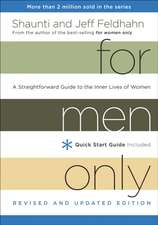About My Father's Business: Taking Your Faith to Work
Autor Regi Campbell Andy Stanleyen Limba Engleză Paperback – 30 sep 2009
About My Father’s Business offers a proven, natural process for becoming a spiritual leader at work, regardless of position or title. Regi Campbell has more than twenty years experience learning and implementing these strategies in companies small and large. With refreshing transparency, he shares his struggles to build his career and pursue his mission to have influence for Jesus Christ with coworkers. The result is a practical guide for reconciling the quest for corporate accomplishment with the call to be an ambassador for Christ around the clock. You will learn how to assess your workplace, identify opportunities, neutralize obstacles, and boldly impact lives for eternity.
Now with a new study guide included.
Doing what I do, I meet sharp business people from all over the world. And from my involvement with top ministry leaders, I meet people who have a passion to share Christ. In Regi Campbell, you get both…If you’re a business person and you’ve been looking for someone to show you what to do next in “taking your faith to work,”this book is for you. If your husband or wife is a business person, this book will challenge them to “get in the game,”but in a way that is smart and effective. And if you are a pastor, this book can provide the business people in you church with a “track to run on” for effective evangelism and discipleship in the marketplace.
— From the foreword by John C. Maxwell, author and founder of The INJOY Group
Preț: 92.00 lei
Nou
Puncte Express: 138
Preț estimativ în valută:
17.60€ • 18.38$ • 14.54£
17.60€ • 18.38$ • 14.54£
Carte disponibilă
Livrare economică 26 martie-09 aprilie
Preluare comenzi: 021 569.72.76
Specificații
ISBN-13: 9781601422262
ISBN-10: 1601422261
Pagini: 237
Dimensiuni: 133 x 205 x 14 mm
Greutate: 0.19 kg
Editura: Multnomah Books
ISBN-10: 1601422261
Pagini: 237
Dimensiuni: 133 x 205 x 14 mm
Greutate: 0.19 kg
Editura: Multnomah Books
Notă biografică
Regi Campbell is the owner of Seedsower Investments, which launches start-up companies with an emphasis in technology. He holds an MBA from the school of business at the University of South Carolina, and he has served as an elder with Andy Stanley at North Point Community Church, one of America’s largest and most rapidly growing churches. Regi and his wife, Miriam, have two adult children and live in Atlanta, Georgia.
Extras
Chapter One
The Curse?
WORK.
It seems destined to be a four-letter word. No matter how you spell it—job, career, calling—it still has curse written all over it. Maybe that’s just the way it’s supposed to be. After all, it was the original curse word, as Adam first lived out the consequences of his cursed life by working the land for food. To this day, work ranks among the leading obstacles in many people’s lives.
It seems the dreams of most working people revolve around arriving at a place where they’ll no longer have to go to work. That’s not to say we don’t enjoy some of the challenges along the way. But if you could dig beneath the surface, the primary objective of most people’s career is to eliminate the need for it.
The primary objective of most people’s career
is to eliminate the need for it.
Advertisers play to this sentiment, tantalizing their target audiences with depictions of financial freedom and absolute autonomy. Statewide lotteries are funded, one dollar at a time, by the pipe dreams of would-be early retirees. While money is the number one obsession in our culture, the ultimate end of wealth is emancipation from the workplace.
It is common sentiment that work is something to be avoided.
Work is universally portrayed as something that gets in the way of all the other things we’d rather be doing. Work calls the shots. It’s the factory whistle that awakens us each day from the dream of a life of leisure. Work drags us from our homes and subjects us to traffic jams and the shark-infested waters of competition. Work drops us back home in a heap at the end of the day, or at the end of a long business trip. Work tells us where we can live, what we should wear, when we can go on vacation, and how much we can spend in between. Wherever our hearts turn in life, work is there dictating the pace and saying yes or no to our heartfelt passions and desires.
We Are What We Do?
As young children, we are encouraged to dream of what we want to be when we grow up. Our educational system is oriented around shaping us into one of the molds that will define us as bachelors in business administration, economics, English, science, or education. Eventually, we refine our identity to the point that we fit nicely into one of the categories that can be found in the yellow pages, or a title on the organizational chart of the company where we work. And after all is settled, one of the first questions people ask when they meet us is, “What do you do?”
In our culture, we are defined by what we do. And everything else revolves around it. Wherever the career opportunities take us is where we raise our families, attend our churches, and join the neighborhood pool. What we do precedes who we are.
There’s just one problem. We don’t want anything to tell us what to do. We love autonomy. So, in allegiance to our human nature, we make it our goal to cheat the system. We work for rapid promotions, we invest for early retirement, and we play the lottery to increase our chances of getting our freedom as soon as we can…winning back control of our lives while we are still young enough to enjoy it.
As the headline for a retirement fund ad put it, “Life is two periods of play separated by forty years of work.”
So work is a curse to be endured. At least, that’s how the average person views work.
But What About Christians?
Surely, we Christians hold a more enlightened view of work. We have beheld the truth that work was ordained by God even before Adam and Eve invented apple pie. We know that God Himself worked and called it good. We embrace the ideal of working “heartily, as to the Lord” (Colossians 3:23, NKJV). We read the Bible and learn that God uses work to mold our character and meet our needs. We understand that work will be one of our joyous assignments in Heaven, not just the lot of those condemned to the other place.
We have learned that work is not really a bad thing in God’s eyes.
And yet, when it comes to being a Christian at work, many believers don’t feel that way at all. We understand that work is not quite the curse we once thought it was. But in our quest to be a beacon of light to a lost world, we often see work as something that gets in the way. We long to live out our faith Monday through Saturday, but we have to go to work instead. We dream of how effective we could be for the Lord…if it weren’t for this lousy job.
We long to live out our faith Monday through Saturday,
but we have to go to work instead.
Somehow, we develop an either/or mentality: I can either be in the secular work world or I can be in ministry, but not in both. We have bifurcated work into these two distinct realms rather than seeing the both/and possibility. What if we could be in the marketplace and be in ministry at the same time? Suppose we saw our workplace as our church and our jobs as our ministry. Suppose we went after our workplace ministry with the same fervor and passion as a twenty-six-year-old youth pastor just out of seminary.
The idea of being in ministry at work was something I had shied away from. I had been a pretty good church member, but work was a whole different ball game. Let me tell you my story, and you’ll see why ministry was pretty far from my thinking in my early career.
I was a rising star at AT&T. At age thirty, I was promoted to division level, one of the youngest ever. At thirty-three, I was to be nominated for the company’s Sloan Fellowship Program, a key prerequisite for moving up the corporate ladder. But on the heels of a transfer from Charlotte, North Carolina, to Atlanta, I experienced a major disruption. What had been a smooth career path suddenly became rocky. At the same time, my marriage was in trouble, the consequence of eleven years of putting my career above everything else. Realizing that I couldn’t hold my life together by myself any longer, I turned to God for help. On a starry night I will never forget, I walked out in the backyard and told God I was finally His. I gave it all up to Him. “It’s You and me, Lord,” I said. “I am going public with my faith. I’m going to stand for something. Whatever happens, happens!”
I was changed forever that night. God gave me a new heart and a new attitude based on a deep gratitude for His forgiveness and His acceptance. I knew that I was loved for the first time in my life. I was ready to live for Him 24-7, but from that point forward, it got even harder to live a dual life.
Away from the office, I devoured Christian books and Bible teaching to feed my spiritual growth. At work, however, I struggled to live out my faith in a world that seemed completely disconnected from the God I was getting to know. I don’t mean I was struggling with sin and backsliding. For once, that wasn’t the problem. It’s just that I lived in a spiritual place that had meaning and purpose, yet I worked in an earthly place that now seemed antiquated and irrelevant. I wanted to move on to my new life, but
this old environment—work—kept getting in the way.
As much as I tried, I couldn’t seem to reconcile those two worlds. Attempts to tell my story and share my faith at work were awkward. And my efforts to operate by biblical principles seemed hypocritical in light of the old reputation that still followed me around. I wanted people to see a reflection of God in me, but I was convinced all they could see was the same old me on a new religious kick. I felt shackled to my past.
I was so grateful for God’s forgiveness, I could hardly contain myself. He had started to restore my marriage; I was in love with my wife and kids in a way that I hadn’t known before. And I was in love with God. I needed to do something bold. I kept dreaming of how effectively I could serve Him, if I could just get away from my job.
Inevitably, I concluded that I should leave the old world and relocate permanently to a different one. After all, the disciples left their nets to follow Jesus.
So I left the world of AT&T behind and started a consulting business where I could live out my new life-purpose statement: “to glorify God by teaching biblical principles to sales and marketing executives.”
At last I was free to be the new me without the constant reminders of what I once was. I could freely talk about my faith without apprehension that I might look like a hypocrite on religious dope. I was free to play on my Christian playground without fear of interruption.
At least, that’s how I saw it.
But as I look back on that experience, I’ve come to realize I may have walked out on an incredible opportunity. What better place to fulfill my new life-purpose statement than as Division Manager of Sales at AT&T Information Systems? We had thousands of employees, hundreds of offices…there was unlimited potential. The more I understand about how God uses Christians in the marketplace, the more I realize that I had been
sitting on a spiritual gold mine back at AT&T. I just didn’t recognize it.
I had been sitting on a spiritual gold mine back at AT&T.
I just didn’t recognize it.
Two Lives Become One
Over the past two decades, I’ve had successes both in business and in helping business people come to faith. Ironically, it took only one year for God to use the consulting business I started to lead me right back to a leadership role in the marketplace—the world of profit and loss, hiring and firing, performance reviews and sales incentives. God was faithful to bring me back to these work environments because that’s where effective ministry can occur. And after being in several situations that more closely resembled the one I left, I eventually figured out how to reconcile those two worlds into one.
Surprisingly, God didn’t need me to be a perfect Christian with a long history of faultless integrity. He just wanted me to seek His kingdom and His righteousness while I excelled at my work, family, church, and community life. Sometimes it’s enough if we’re willing just to stick around and let people watch God take over our hearts. That simple example, with all its awkwardness and blemishes, can be the most convincing evidence of God they will ever see.
I’ve now spent more than twenty years helping people see how relevant God is to our everyday lives. As a friend of mine says, we need to “turn Bible leather into shoe leather”…to get God out of the stained glass and into our relationships.
After all those experiences, I’m left with a haunting question. How many Christians are ignoring the monkey? How many would like to make a difference, but just don’t know what to do? How many are surrounded by a ripe harvest, but just don’t know how to recognize it?
I mentor eight young men each year, so I’m continually around young Christians who remind me of myself twenty years ago. They struggle with living out their faith at work. I’ll bet I’ve had a dozen guys ask me about quitting work and going to seminary or starting their own “Christian” business. And others simply settle for the compromise of living a dual life, confining the focus and energy of their Christianity to church activities
while keeping a low spiritual profile at work.
They’re not alone. As I look across the landscape of believers today, I see a lot of Christians wrestling with what a true disciple of Christ should look like in the workplace. Somewhere along the way, we’ve lost our vision for how Christ would conduct ministry at work. Over the last century, the business culture has been constantly reinventing itself with new technologies and innovations. But Christianity, it seems, has been left behind.
That’s not to say there aren’t Christians in the marketplace. It’s just that they lack the zeal and confidence that’s truly representative of what God is doing inside them. Or they just don’t know what God would have them do.
We’ve lost our vision for how Christ would conduct ministry at work.
The problem is that when a person begins to grow in his passion for God, it creates tension at work. We know how to express our true feelings in church or in private, but how should we act around the office or in the field or in the factory? What does it look like? Should we come on strong and risk offending people? Or should we take the long road and hope our faith just rubs off on others over time?
It only takes one or two awkward experiences for Christians to realize that an enthusiasm for God doesn’t exactly blend seamlessly into the American business culture. We learn quickly that you can’t be careless about it. Subconsciously, it’s easier to suppress our kingdom calling in order to ease the clash of cultures we face each day. When we’re not sure what to do, it’s safer to do nothing. Why rock the boat?
Eventually, Christians tend to adopt one of two solutions to relieve the tension they feel at work. They either run or they hide.
The run response comes from the idea that it would just be easier to make a clean break—to start over in a new environment or to withdraw completely by enrolling in seminary and going into ministry full-time. There was an element of this driving my decision to leave AT&T and start a consulting business. Rather than make my current workplace my ministry, I ran away to create an environment that was more comfortable and controllable.
The hide response is nothing less than a subtle surrender of the mission. Unsure of how to interface our exuberance for God with a workplace that may not appreciate it, we tone it down around the office. And the fervor we feel on Sunday gets squelched a little from Monday to Friday. Essentially, we hide our true self from the work world.
Somehow we can’t quite grasp the vision of our work as an opportunity to share our faith. I’m the first to admit that it doesn’t come easily. But after twenty years of practicing marketplace ministry and teaching these principles to others, I’ve come up with an approach that will give you a clear vision for your calling to be about our Father’s business at work.
You see, regardless of how uncomfortable the tension may seem now, God doesn’t call us to run. And He doesn’t teach us to hide. Chances are He wants to use you right where you are. How else will people who don’t go to church find out about the relationship their Heavenly Father longs to have with them? It’s not like it’s talked about in the places they frequent. But because of your unique position in their lives, you have the opportunity
to be someone God can use to tell them. And it doesn’t have to feel awkward. When you understand your role in the process, it can be one of the most natural and rewarding experiences you will ever know.
The disciples may have dropped their nets, but they didn’t run or hide. They spent the next several years living and ministering among many of the same people that already knew them. Often, we must prove faithful in our current mission field before God will entrust a new one to us. And as we’ll see, sometimes God does powerful things when we simply hang around long enough to allow others a chance to witness the transformation in our lives.
In the pages that follow, I’d like to give you a step-by-step plan for how you can begin the work of ministry right where you are. You will learn a strategy for assessing your workplace, identifying your opportunities, neutralizing the primary obstacles, and boldly enjoying the mission God gives you.
Work is not a curse for Christians. It’s a place where you live out your faith, reflecting what God is doing in your life. In light of eternity, the ministry you accomplish at work can be more important than the money you earn or the career you sustain. And once you see the impact God can have through you on the job, you will never look at your workplace the same again.
Work is a place where you live out your faith,
reflecting what God is doing in your life.
If you want to experience true joy in your life (both this one and the next), if you want to do work that really matters, if you want to have peace in your life all the time, and if you want to have a fulfilling work life, commit yourself to the process that I’m going to show you.
Go to your job and do great work, but while you’re at it, be about our Father’s business.
You can do this!
The Curse?
WORK.
It seems destined to be a four-letter word. No matter how you spell it—job, career, calling—it still has curse written all over it. Maybe that’s just the way it’s supposed to be. After all, it was the original curse word, as Adam first lived out the consequences of his cursed life by working the land for food. To this day, work ranks among the leading obstacles in many people’s lives.
It seems the dreams of most working people revolve around arriving at a place where they’ll no longer have to go to work. That’s not to say we don’t enjoy some of the challenges along the way. But if you could dig beneath the surface, the primary objective of most people’s career is to eliminate the need for it.
The primary objective of most people’s career
is to eliminate the need for it.
Advertisers play to this sentiment, tantalizing their target audiences with depictions of financial freedom and absolute autonomy. Statewide lotteries are funded, one dollar at a time, by the pipe dreams of would-be early retirees. While money is the number one obsession in our culture, the ultimate end of wealth is emancipation from the workplace.
It is common sentiment that work is something to be avoided.
Work is universally portrayed as something that gets in the way of all the other things we’d rather be doing. Work calls the shots. It’s the factory whistle that awakens us each day from the dream of a life of leisure. Work drags us from our homes and subjects us to traffic jams and the shark-infested waters of competition. Work drops us back home in a heap at the end of the day, or at the end of a long business trip. Work tells us where we can live, what we should wear, when we can go on vacation, and how much we can spend in between. Wherever our hearts turn in life, work is there dictating the pace and saying yes or no to our heartfelt passions and desires.
We Are What We Do?
As young children, we are encouraged to dream of what we want to be when we grow up. Our educational system is oriented around shaping us into one of the molds that will define us as bachelors in business administration, economics, English, science, or education. Eventually, we refine our identity to the point that we fit nicely into one of the categories that can be found in the yellow pages, or a title on the organizational chart of the company where we work. And after all is settled, one of the first questions people ask when they meet us is, “What do you do?”
In our culture, we are defined by what we do. And everything else revolves around it. Wherever the career opportunities take us is where we raise our families, attend our churches, and join the neighborhood pool. What we do precedes who we are.
There’s just one problem. We don’t want anything to tell us what to do. We love autonomy. So, in allegiance to our human nature, we make it our goal to cheat the system. We work for rapid promotions, we invest for early retirement, and we play the lottery to increase our chances of getting our freedom as soon as we can…winning back control of our lives while we are still young enough to enjoy it.
As the headline for a retirement fund ad put it, “Life is two periods of play separated by forty years of work.”
So work is a curse to be endured. At least, that’s how the average person views work.
But What About Christians?
Surely, we Christians hold a more enlightened view of work. We have beheld the truth that work was ordained by God even before Adam and Eve invented apple pie. We know that God Himself worked and called it good. We embrace the ideal of working “heartily, as to the Lord” (Colossians 3:23, NKJV). We read the Bible and learn that God uses work to mold our character and meet our needs. We understand that work will be one of our joyous assignments in Heaven, not just the lot of those condemned to the other place.
We have learned that work is not really a bad thing in God’s eyes.
And yet, when it comes to being a Christian at work, many believers don’t feel that way at all. We understand that work is not quite the curse we once thought it was. But in our quest to be a beacon of light to a lost world, we often see work as something that gets in the way. We long to live out our faith Monday through Saturday, but we have to go to work instead. We dream of how effective we could be for the Lord…if it weren’t for this lousy job.
We long to live out our faith Monday through Saturday,
but we have to go to work instead.
Somehow, we develop an either/or mentality: I can either be in the secular work world or I can be in ministry, but not in both. We have bifurcated work into these two distinct realms rather than seeing the both/and possibility. What if we could be in the marketplace and be in ministry at the same time? Suppose we saw our workplace as our church and our jobs as our ministry. Suppose we went after our workplace ministry with the same fervor and passion as a twenty-six-year-old youth pastor just out of seminary.
The idea of being in ministry at work was something I had shied away from. I had been a pretty good church member, but work was a whole different ball game. Let me tell you my story, and you’ll see why ministry was pretty far from my thinking in my early career.
I was a rising star at AT&T. At age thirty, I was promoted to division level, one of the youngest ever. At thirty-three, I was to be nominated for the company’s Sloan Fellowship Program, a key prerequisite for moving up the corporate ladder. But on the heels of a transfer from Charlotte, North Carolina, to Atlanta, I experienced a major disruption. What had been a smooth career path suddenly became rocky. At the same time, my marriage was in trouble, the consequence of eleven years of putting my career above everything else. Realizing that I couldn’t hold my life together by myself any longer, I turned to God for help. On a starry night I will never forget, I walked out in the backyard and told God I was finally His. I gave it all up to Him. “It’s You and me, Lord,” I said. “I am going public with my faith. I’m going to stand for something. Whatever happens, happens!”
I was changed forever that night. God gave me a new heart and a new attitude based on a deep gratitude for His forgiveness and His acceptance. I knew that I was loved for the first time in my life. I was ready to live for Him 24-7, but from that point forward, it got even harder to live a dual life.
Away from the office, I devoured Christian books and Bible teaching to feed my spiritual growth. At work, however, I struggled to live out my faith in a world that seemed completely disconnected from the God I was getting to know. I don’t mean I was struggling with sin and backsliding. For once, that wasn’t the problem. It’s just that I lived in a spiritual place that had meaning and purpose, yet I worked in an earthly place that now seemed antiquated and irrelevant. I wanted to move on to my new life, but
this old environment—work—kept getting in the way.
As much as I tried, I couldn’t seem to reconcile those two worlds. Attempts to tell my story and share my faith at work were awkward. And my efforts to operate by biblical principles seemed hypocritical in light of the old reputation that still followed me around. I wanted people to see a reflection of God in me, but I was convinced all they could see was the same old me on a new religious kick. I felt shackled to my past.
I was so grateful for God’s forgiveness, I could hardly contain myself. He had started to restore my marriage; I was in love with my wife and kids in a way that I hadn’t known before. And I was in love with God. I needed to do something bold. I kept dreaming of how effectively I could serve Him, if I could just get away from my job.
Inevitably, I concluded that I should leave the old world and relocate permanently to a different one. After all, the disciples left their nets to follow Jesus.
So I left the world of AT&T behind and started a consulting business where I could live out my new life-purpose statement: “to glorify God by teaching biblical principles to sales and marketing executives.”
At last I was free to be the new me without the constant reminders of what I once was. I could freely talk about my faith without apprehension that I might look like a hypocrite on religious dope. I was free to play on my Christian playground without fear of interruption.
At least, that’s how I saw it.
But as I look back on that experience, I’ve come to realize I may have walked out on an incredible opportunity. What better place to fulfill my new life-purpose statement than as Division Manager of Sales at AT&T Information Systems? We had thousands of employees, hundreds of offices…there was unlimited potential. The more I understand about how God uses Christians in the marketplace, the more I realize that I had been
sitting on a spiritual gold mine back at AT&T. I just didn’t recognize it.
I had been sitting on a spiritual gold mine back at AT&T.
I just didn’t recognize it.
Two Lives Become One
Over the past two decades, I’ve had successes both in business and in helping business people come to faith. Ironically, it took only one year for God to use the consulting business I started to lead me right back to a leadership role in the marketplace—the world of profit and loss, hiring and firing, performance reviews and sales incentives. God was faithful to bring me back to these work environments because that’s where effective ministry can occur. And after being in several situations that more closely resembled the one I left, I eventually figured out how to reconcile those two worlds into one.
Surprisingly, God didn’t need me to be a perfect Christian with a long history of faultless integrity. He just wanted me to seek His kingdom and His righteousness while I excelled at my work, family, church, and community life. Sometimes it’s enough if we’re willing just to stick around and let people watch God take over our hearts. That simple example, with all its awkwardness and blemishes, can be the most convincing evidence of God they will ever see.
I’ve now spent more than twenty years helping people see how relevant God is to our everyday lives. As a friend of mine says, we need to “turn Bible leather into shoe leather”…to get God out of the stained glass and into our relationships.
After all those experiences, I’m left with a haunting question. How many Christians are ignoring the monkey? How many would like to make a difference, but just don’t know what to do? How many are surrounded by a ripe harvest, but just don’t know how to recognize it?
I mentor eight young men each year, so I’m continually around young Christians who remind me of myself twenty years ago. They struggle with living out their faith at work. I’ll bet I’ve had a dozen guys ask me about quitting work and going to seminary or starting their own “Christian” business. And others simply settle for the compromise of living a dual life, confining the focus and energy of their Christianity to church activities
while keeping a low spiritual profile at work.
They’re not alone. As I look across the landscape of believers today, I see a lot of Christians wrestling with what a true disciple of Christ should look like in the workplace. Somewhere along the way, we’ve lost our vision for how Christ would conduct ministry at work. Over the last century, the business culture has been constantly reinventing itself with new technologies and innovations. But Christianity, it seems, has been left behind.
That’s not to say there aren’t Christians in the marketplace. It’s just that they lack the zeal and confidence that’s truly representative of what God is doing inside them. Or they just don’t know what God would have them do.
We’ve lost our vision for how Christ would conduct ministry at work.
The problem is that when a person begins to grow in his passion for God, it creates tension at work. We know how to express our true feelings in church or in private, but how should we act around the office or in the field or in the factory? What does it look like? Should we come on strong and risk offending people? Or should we take the long road and hope our faith just rubs off on others over time?
It only takes one or two awkward experiences for Christians to realize that an enthusiasm for God doesn’t exactly blend seamlessly into the American business culture. We learn quickly that you can’t be careless about it. Subconsciously, it’s easier to suppress our kingdom calling in order to ease the clash of cultures we face each day. When we’re not sure what to do, it’s safer to do nothing. Why rock the boat?
Eventually, Christians tend to adopt one of two solutions to relieve the tension they feel at work. They either run or they hide.
The run response comes from the idea that it would just be easier to make a clean break—to start over in a new environment or to withdraw completely by enrolling in seminary and going into ministry full-time. There was an element of this driving my decision to leave AT&T and start a consulting business. Rather than make my current workplace my ministry, I ran away to create an environment that was more comfortable and controllable.
The hide response is nothing less than a subtle surrender of the mission. Unsure of how to interface our exuberance for God with a workplace that may not appreciate it, we tone it down around the office. And the fervor we feel on Sunday gets squelched a little from Monday to Friday. Essentially, we hide our true self from the work world.
Somehow we can’t quite grasp the vision of our work as an opportunity to share our faith. I’m the first to admit that it doesn’t come easily. But after twenty years of practicing marketplace ministry and teaching these principles to others, I’ve come up with an approach that will give you a clear vision for your calling to be about our Father’s business at work.
You see, regardless of how uncomfortable the tension may seem now, God doesn’t call us to run. And He doesn’t teach us to hide. Chances are He wants to use you right where you are. How else will people who don’t go to church find out about the relationship their Heavenly Father longs to have with them? It’s not like it’s talked about in the places they frequent. But because of your unique position in their lives, you have the opportunity
to be someone God can use to tell them. And it doesn’t have to feel awkward. When you understand your role in the process, it can be one of the most natural and rewarding experiences you will ever know.
The disciples may have dropped their nets, but they didn’t run or hide. They spent the next several years living and ministering among many of the same people that already knew them. Often, we must prove faithful in our current mission field before God will entrust a new one to us. And as we’ll see, sometimes God does powerful things when we simply hang around long enough to allow others a chance to witness the transformation in our lives.
In the pages that follow, I’d like to give you a step-by-step plan for how you can begin the work of ministry right where you are. You will learn a strategy for assessing your workplace, identifying your opportunities, neutralizing the primary obstacles, and boldly enjoying the mission God gives you.
Work is not a curse for Christians. It’s a place where you live out your faith, reflecting what God is doing in your life. In light of eternity, the ministry you accomplish at work can be more important than the money you earn or the career you sustain. And once you see the impact God can have through you on the job, you will never look at your workplace the same again.
Work is a place where you live out your faith,
reflecting what God is doing in your life.
If you want to experience true joy in your life (both this one and the next), if you want to do work that really matters, if you want to have peace in your life all the time, and if you want to have a fulfilling work life, commit yourself to the process that I’m going to show you.
Go to your job and do great work, but while you’re at it, be about our Father’s business.
You can do this!













